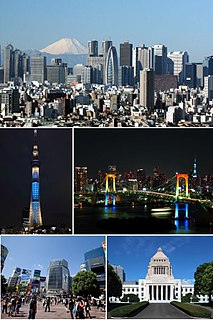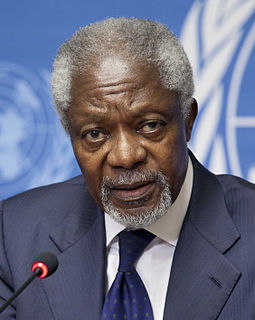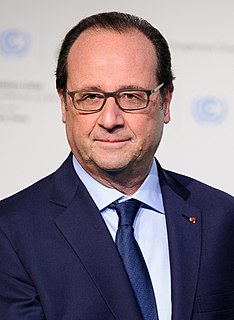
The United Nations Economic and Social Council is one of the six principal organs of the United Nations, responsible for coordinating the economic and social fields of the organisation, specifically in regards to the 15 specialised agencies, the eight functional commissions and the five regional commissions under its jurisdiction.

The United Nations Secretariat is one of the six major organs of the United Nations, with the others being (a) the General Assembly; (b) the Security Council; (c) the Economic and Social Council; (d) the defunct Trusteeship Council; and (e) the International Court of Justice. The Secretariat is the United Nations' executive arm. The Secretariat has an important role in setting the agenda for the UN's deliberative and decision making bodies of the UN, and the implementation of the decision of these bodies. The Secretary-General, who is appointed by the General Assembly, is the head of the secretariat.
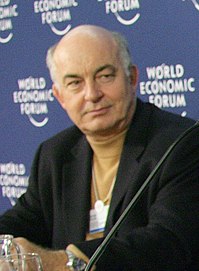
Kemal Derviş is a Turkish economist and politician, and former head of the United Nations Development Programme. He was honored by the government of Japan for having "contributed to mainstreaming Japan's development assistance policy through the United Nations". In 2005, he was ranked 67th in the Top 100 Public Intellectuals Poll conducted by Prospect and Foreign Policy magazines. He is Vice President and Director of the Global Economy and Development program at the Brookings Institution and part-time professor of international economics at the Graduate Institute of International and Development Studies in Geneva.

Luísa Dias Diogo was Prime Minister of Mozambique from February 2004 to January 2010. She replaced Pascoal Mocumbi, who had been Prime Minister for the previous nine years. Before becoming Prime Minister, she was Minister of Planning and Finance, and she continued to hold that post until February 2005. She was the first female Prime Minister of Mozambique. Diogo represents the party FRELIMO, which has ruled the country since independence in 1975.

Pierre Moscovici is a French politician currently serving as the European Commissioner for Economic and Financial Affairs, Taxation and Customs. Previously he served as a senior French politician, as Minister of Finance from 2012 to 2014 and as Minister for European Affairs between 1997 and 2002.

Philippe Douste-Blazy is a United Nations official and former French centre-right politician. He has been Under-Secretary-General, Special Adviser on Innovative Financing for Development in the United Nations since 2008 and chairman of UNITAID since 2006.

Celso Luiz Nunes Amorim is a Brazilian diplomat who served as Minister of Foreign Relations from July 20, 1993 to December 31, 1994 under President Itamar Franco and again from January 1, 2003 to December 31, 2010 under President Luiz Inácio Lula da Silva. He was Minister of Defence from August 4, 2011 to December 31, 2014 under President Dilma Rousseff.
Calestous Juma FRS HonFREng was an internationally recognised authority in the application of science and technology to sustainable development worldwide. He was named one of the most influential 100 Africans in 2012, 2013 and 2014 by the New African magazine. He was Professor of the Practice of International Development and Faculty Chair of the Innovation for Economic Development Executive Program at Harvard Kennedy School. Juma was Director of the School's Science, Technology and Globalization Project at Harvard Kennedy School as well as the Agricultural Innovation in Africa Project funded by the Bill and Melinda Gates Foundation. His latest book, Innovation and Its Enemies: Why People Resist New Technologies. was published by Oxford University Press in 2016.

Alicia Isabel Adriana Bárcena Ibarra is a Mexican biologist who currently serves as the Executive Secretary of the United Nations Economic Commission for Latin America and the Caribbean (ECLAC).

The United Nations Peacebuilding Commission (PBC) is a United Nations Intergovernmental advisory body of both the United Nations General Assembly and the United Nations Security Council that supports peace efforts in conflict affected countries, and is a key addition to the capacity of the international community in the broad peace agenda. It was established in 2005 with the passage of both A/RES/60/180 and S/RES/1645
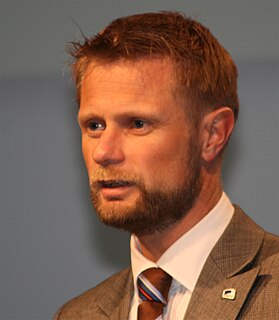
Bent Høie is a Norwegian politician from the Conservative Party who has been Minister of Health and Care Services since 16 October 2013. He is a representative of Rogaland in the Storting and was first elected in 2001.

Jean-Michel Severino is General Inspector of Finances, at the French Ministry of Finances.

Enrico Giovannini is an Italian economist and statistician, member of the Club of Rome. Since 2002, he has been a full professor of economic statistics at the University of Rome Tor Vergata. He is Senior Fellow of the LUISS "School of European Political Economy", member of the “Commission Economique de la Nation” of the French Government, and co-chair of the "Independent Expert Advisory Group on the Data Revolution for Sustainable Development" established by the Secretary-General of the United Nations. He is also chair and member of several boards of Italian and international organisations. From April 2013 to February 2014 he was Minister of labour and social policies in the Italian government. From August 2009 to April 2013 he was President of the Italian Statistical Institute (Istat). From January 2001 to July 2009, he was Director of Statistics and Chief Statistician of the Organisation for Economic Co-operation and Development (OECD).

Ernesto Javier Cordero Arroyo is a Mexican politician. He is an actuary, a public servant and a Mexican politician affiliated with the “Partido Acción Nacional.
Philippe Mario Aghion FBA is a French economist.

The United Nations Entity for Gender Equality and the Empowerment of Women, also known as UN Women, is a United Nations entity working for the empowerment of women.

The Post-2015 Development Agenda was a process from 2012 to 2015 led by the United Nations to define the future global development framework that would succeed the Millennium Development Goals. The new framework, starting from 2016 is called Sustainable Development Goals.
Rosa Pavanelli is the General Secretary of Public Services International, the global union federation for public sector trade unions.
Virendra Dayal is a retired Indian Administrative Service officer and United Nations civil servant who served as Chef de Cabinet to Secretary General of the United Nations for more than a decade. He has served as the director of the Office of Special Political Affairs of the United Nations and as the special envoy who probed the allegations levelled against a number of India politicians including Natwar Singh, a former Minister of External affairs, in the Paul Volcker Committee report of 2005. A former Indian Administrative Service officer and a Rhodes Scholar of 1956 Dayal sat on the National Human Rights Commission of India as a member for two terms from 1998 to 2006. The Government of India awarded him the third highest civilian honour of the Padma Bhushan, in 1992, for his contributions to society.
